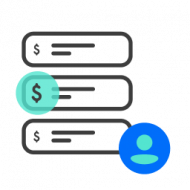No matter what stage of growth your small business is in, there’s likely going to come a time when you’ll need access to more funds. Many businesses, both large and small, use borrowed capital to smooth out uneven cash flow, fuel growth and fund other business initiatives. Whatever the need, a small business loan is one of the most sought-after methods of funding. Here’s how to get a small business loan.
6 Steps to Get a Business Loan
- Learn what lenders look for.
- Decide what type of financing you need.
- Find out how to get approved.
- Gather documentation.
- Find a lender.
- Fill out the application.
1. Learn what lenders look for
Before you apply, it’s helpful to understand how lenders are likely to evaluate your business loan application. Lender profits are based upon whether or not borrowers pay back loans. With that in mind, they may consider a number of factors including revenue or cash flow, time in business, personal credit scores, business credit scores, collateral, and industry.
Some lenders dig deeper and may require detailed financial statements and tax returns. (This is especially true of traditional lenders such as banks or credit unions.)
Time in business
Startups will find it especially challenging to get business financing. Lenders prefer a track record of successfully servicing debt as well as running a business. Traditional lenders will often require two years in business, but some online lenders only require a year in business. Idea-stage startups (businesses without revenues) have the most difficult time qualifying for term loans or lines of credit, but a business credit card or crowdfunding could be a good option.
The better your personal credit, the more options you may have looking for a small business loan.
Personal credit scores
As a small business owner, your personal credit score will often be a part of an evaluation of your creditworthiness. This is especially true for younger businesses or those without significant revenues. That’s because lenders are trying to determine whether you are likely to make payments on time, based upon what you’ve done in the past. Before you apply for small business financing, it’s critical that you understand your credit profile.
Don’t ignore trade credit from your suppliers either, that is one of the most underused types of business credit available to businesses.
Business credit scores
Some lenders will check business credit reports and/or business credit scores from the major business credit bureaus. In many cases, they want to see a positive payment history as well as avoid lending to businesses with a negative payment history, including late payments, collection accounts or judgments. They may also check business credit to determine the number of UCC filings. Too many UCC filings may be considered high risk.
Cash flow
Lenders want to confirm that you have the ability to make periodic payments. Your cash flow is a good indication of whether or not your business has the financial ability to make payments on a small business loan. Many business lenders now will also want to review at least three months worth of your business bank statements before they will approve a term loan, a line of credit, or even a business credit card.
Collateral
Traditional lenders, including banks, credit unions, as well as those that make SBA loans, will likely require collateral for most small business loans. (Note, though, most SBA loans can’t be declined solely because the applicant doesn’t have collateral.) You’ll have more choices if you can guarantee your loan with real, tangible items such as real estate, equipment or other collateral.
Loans not secured with any specific asset or collateral, but rather a general lien, may be referred to as unsecured loans. In reality though, truly unsecured loans are rare and only offered to a lender’s most eligible customers. Even an unsecured loan that doesn’t require collateral may result in the lender placing a UCC lien and or requiring a personal guarantee.
Industry
Some industries are more difficult to finance than others. Industry is usually identified by the SIC or NAICS code. Some small business lenders have preferences that influence their financing decisions. Some lenders publish a list of their restricted industries you can review online before you apply.
2. Decide what type of loan or financing you need
Although you don’t necessarily need to be a small business financing expert, with so many loan options available, it’s important to at least be familiar with the types of financing that will best meet your business needs. These options include:
Small Business Administration (SBA) Loan
SBA loans are available in amounts from less than $50,000 up to $5 million, and offer low rates and favorable repayment terms. Only SBA Disaster Loans (including Economic Injury Disaster Loans or EIDL) are made by the U.S. Small Business Administration. All others are made by participating lenders. The loan process can take weeks or months, depending on the type of SBA loan you are trying to obtain.
FAQs
How much income do you need to get a business loan?
Minimum income requirements vary by lender, but most require at least $5,000 to $10,000 in average monthly revenues. Crowdfunding is a notable exception and can be available to businesses with a great idea but no revenues. Business credit card issuers often make the decision based on the owner’s total income (including personal income) rather than just business revenue.
How do I get a business loan for the first time?
One of the most common questions people ask when launching a startup is “How can I pay for it?” When looking for a loan to start a business, without a track record or revenue, it will be difficult. You can demonstrate your business acumen with a well-written business plan, and secure your loan with collateral—which will improve the odds, but it will still be challenging. Since you don’t have a business yet, your personal credit score will be the only thing a lender has to evaluate your creditworthiness.
You may need to get creative and consider crowdfunding, small business credit cards or even loans from friends and family.
What credit score is needed to get a business loan?
Most traditional lenders, like banks and credit unions require good credit scores. A minimum credit score of 680 or 700 is often required, though some lenders go as low as 650. The threshold for SBA loans can vary by lender, but 680 or higher is typical. (Keep in mind financial institutions may require a personal credit check for each owner with 20% or greater ownership.)
Many online lenders are more flexible. Some lend to borrowers with personal credit scores in the mid-600s, and some go even lower. Merchant cash advance (or business cash advance) providers, as well as other alternative financing options will sometimes provide financing to borrowers with credit scores as low as 500 with adequate revenues.
How hard is it to get a business loan?
It depends on the type of loan and your qualifications. As a general rule, bank loans (including SBA loans) have the most involved application process and require the greatest amount of documentation.
Online lenders may be very fast and flexible. Link your bank account so they can analyze revenues and you may be able to get an approval in a few hours, and funding the next day.
What bank is easiest to get a business loan?
If you’re looking for a loan that’s easiest to qualify for, a bank may not be your best option. Banks must comply with state and federal banking regulations that can affect the risk they are willing to take. Many cater to well-qualified borrowers.
However, if you have access to a community bank or a credit union that makes small business loans you may want to find out about their criteria to determine whether you may qualify. Otherwise, you’ll want to look at other lending options we’ve discussed.
How Nav helps small businesses get loans
Nav can connect you to financing options based on your qualifications. Nav’s marketplace will sort and match over 100 financing options for your business so you can apply with confidence. It’s simple and you can sign up for free.






Hi
I’m just starting a business and I don’t have any income coming in for it yet. Which credit card or product would you recommend to get started to buy things for the company?
Most small business credit card applications will allow you to include income from all sources, not just the business. If you have income from other sources that could help you qualify.
I have two vendor accounts that are not reported on my business report. How do I get these accounts added to my business report through my Established Business plan with Nav?
Unfortunately Nav cannot report other vendors accounts. (We report for our customers with Business Boost or Business Loan Builder accounts.) You’ll need to ask those vendors to report directly to credit bureaus.
I’m looking at the capital one spark cash select business card. Do you have any idea what credit is needed?? I’m getting so many different scales on the internet. Thank you
The issuers aren’t eager to publish minimum credit scores (and the score you see may be different than the one they use). It may help to have a Nav account and see which cards are a good match. It’s not full preapproval but it should help to get you in the ballpark.
Capital one spark did not approve me due to a open bankruptcy on my personal credit
I’m sorry to hear that.
Hi I just heard about Nav , I have a decent credit FICO 740; also I have my LLC company with out credit history since 2007 was launched, my question is about create a credit to my company with just my EIN and create a trade lines separate from my personal credit, it’s possible?
Thanks
Yes try capital one spark.